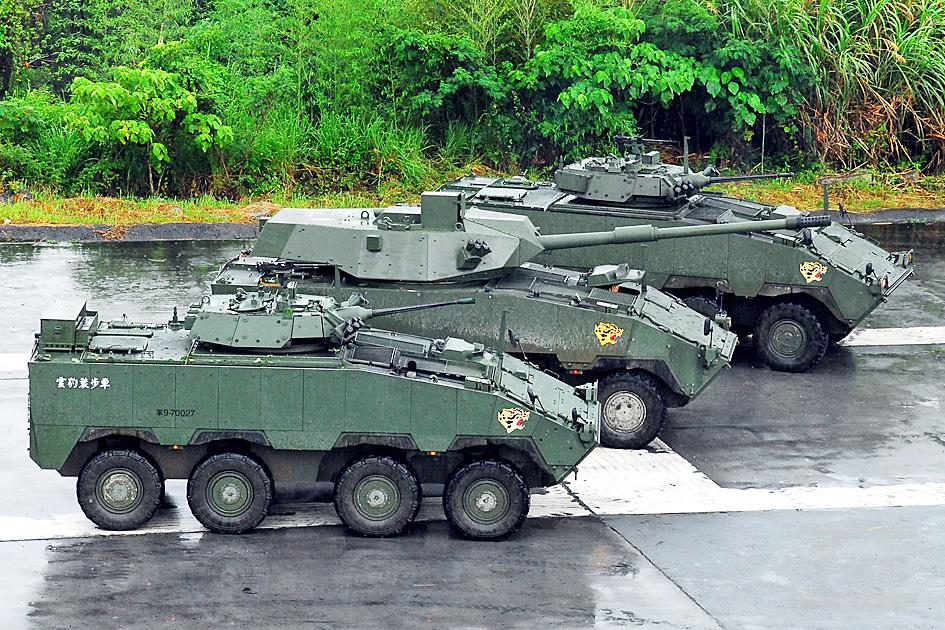The military is to mount two tank guns purchased from the US on domestically made armored vehicles to aid in the research and development (R&D) of mobile gun systems, sources said on Saturday.
Two sets of M68A2 105mm tank guns are to be mounted on Taiwanese-built CM-32 Clouded Leopards, the sources said.
The official R&D would start next year, and the military hopes to produce two prototypes by 2023, they added.

Photo courtesy of the Military News Agency
A 105mm tank gun is expected to be the main weapon of armored vehicles, with a secondary system to incorporate a 7.62mm coaxial machine gun with a 12.7mm remote-controlled machine gun turret.
Sources in the military said that armored vehicles using 105mm barrels are expected to replace outdated light tanks used by mechanized infantry battalions.
The new vehicles can provide increased mobility and firepower, they said.
However, as the vehicle chassis weighs about 30 to 40 tonnes, R&D would have to find ways to reduce the recoil of the 105mm barrel to 70 percent of equivalent cannons currently used by the military, sources said.
The US government on Dec. 4 last year approved the export of the weapons and is expected to ship them to Taiwan in September after live-fire testing.
The Chungshan Institute of Science and Technology has requested the equipment provider to include mechanical blueprints and six other technical documents, sources said, adding that the institute in January finalized and signed a Technical Assistance Agreement with the provider.
In addition to plans to produce two prototype vehicles by 2023, the Ministry of National Defense has said it also hopes to develop 105mm armor-piercing rounds.

The High Prosecutors’ Office yesterday withdrew an appeal against the acquittal of a former bank manager 22 years after his death, marking Taiwan’s first instance of prosecutors rendering posthumous justice to a wrongfully convicted defendant. Chu Ching-en (諸慶恩) — formerly a manager at the Taipei branch of BNP Paribas — was in 1999 accused by Weng Mao-chung (翁茂鍾), then-president of Chia Her Industrial Co, of forging a request for a fixed deposit of US$10 million by I-Hwa Industrial Co, a subsidiary of Chia Her, which was used as collateral. Chu was ruled not guilty in the first trial, but was found guilty

DEADLOCK: As the commission is unable to forum a quorum to review license renewal applications, the channel operators are not at fault and can air past their license date The National Communications Commission (NCC) yesterday said that the Public Television Service (PTS) and 36 other television and radio broadcasters could continue airing, despite the commission’s inability to meet a quorum to review their license renewal applications. The licenses of PTS and the other channels are set to expire between this month and June. The National Communications Commission Organization Act (國家通訊傳播委員會組織法) stipulates that the commission must meet the mandated quorum of four to hold a valid meeting. The seven-member commission currently has only three commissioners. “We have informed the channel operators of the progress we have made in reviewing their license renewal applications, and

Taiwan People’s Party (TPP) Chairman Huang Kuo-chang (黃國昌) yesterday appealed to the authorities to release former Taipei mayor Ko Wen-je (柯文哲) from pretrial detention amid conflicting reports about his health. The TPP at a news conference on Thursday said that Ko should be released to a hospital for treatment, adding that he has blood in his urine and had spells of pain and nausea followed by vomiting over the past three months. Hsieh Yen-yau (謝炎堯), a retired professor of internal medicine and Ko’s former teacher, said that Ko’s symptoms aligned with gallstones, kidney inflammation and potentially dangerous heart conditions. Ko, charged with

Taiwan-based publisher Li Yanhe (李延賀) has been sentenced to three years in prison, fined 50,000 yuan (US$6,890) in personal assets and deprived political rights for one year for “inciting secession” in China, China's Taiwan Affairs Office spokesman Chen Binhua (陳斌華) said today. The Shanghai First Intermediate People’s Court announced the verdict on Feb. 17, Chen said. The trial was conducted lawfully, and in an open and fair manner, he said, adding that the verdict has since come into legal effect. The defendant reportedly admitted guilt and would appeal within the statutory appeal period, he said, adding that the defendant and his family have